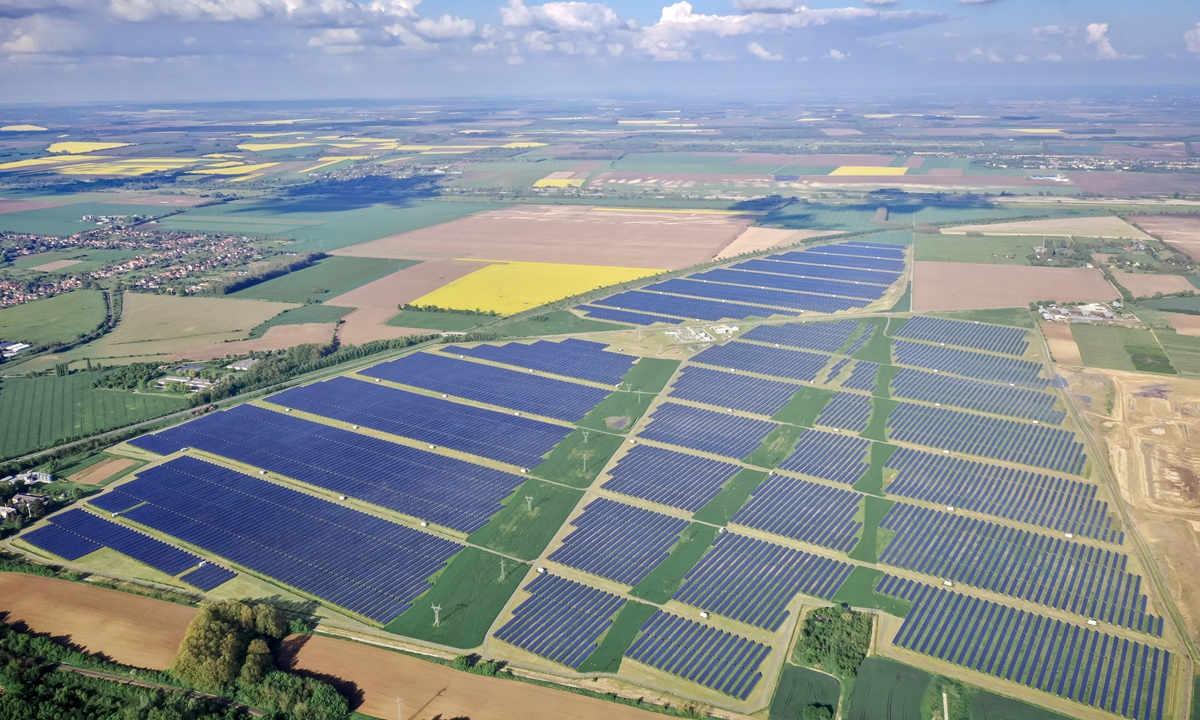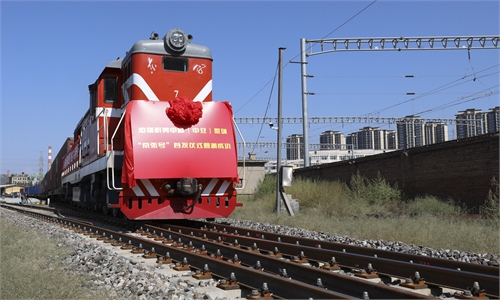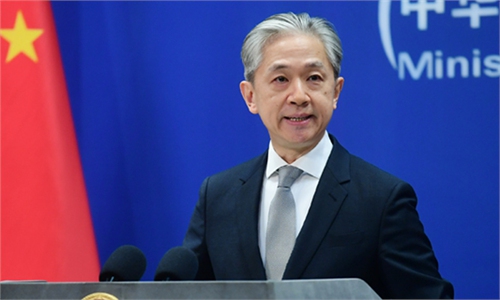China-Hungary solar project emerges as a frontrunner in green development amid European clean energy headwinds, derisking measures
China-Hungary solar project shines amid European clean energy headwinds

The Kaposvar solar power plant in Hungary Photo: Courtesy of China National Machinery Import & Export Corporation
In Kaposvar, a populous city in southwestern Hungary, what readily catches the attention of passersby are hundreds of thousands of solar panels covering an extensive expanse of land, creating a breathtaking "sea of blue." This grand project stands as one of the largest solar power plants under the China-proposed Belt and Road Initiative in Hungary.
Since its launch in January 2021, the Kaposvar solar power plant has played an increasingly significant role in advancing the use of clean energy in Central and Eastern Europe, simultaneously ensuring regional electricity supply, fostering job creation, and facilitating its energy transformation in alignment with the area's economic development needs.
The Hungarian project is the epitome of China's substantial contribution to the green energy transformation in Europe. Europe accounted for more than 50 percent of China's total photovoltaic (PV) exports in 2022, making it China's largest overseas PV market. Other new energy products such as wind turbines and new electric vehicles have also gained strong foothold in the EU markets, making great contribution to the region's clean energy transformation while facilitating its energy supplies.
Despite this, some Western politicians having intensified decoupling or de-risking efforts targeting China, and the new energy industry that has been a frontrunner in China-EU cooperation bears the brunt.
Experts asserted that this escalated moves on Chinese companies and their products, spanning from solar panels to new energy vehicle batteries, ignores the contributions and strengthened relationships these Chinese companies have fostered in the region.
Instead, it disrupts regular market activities, fair competition, and hampers Europe's advancement toward green transformation, experts said.
Tighter bonds
Amidst calls from some Western politicians for decoupling, the Global Times in Hungary observed a strengthening connection. This connection is not imposed but mutually advantageous and sustainable - Chinese companies seek to tap into a broader European market through Hungary, while Hungary facilitates its energy transformation by partnering with competitive Chinese enterprises in the field.
As Hungary's economy grows, its need for electricity has surged. However, relying heavily on imported power has proven unsustainable. To tackle this issue, the Hungarian government has taken steps to boost renewable energy and decrease the capacity of conventional power plants.
In response to this initiative, the Kaposvar solar power plant, funded and built by China National Machinery Import & Export Corporation (CMC), a leading Chinese international engineering contractor, stands as a significant collaborative project in this context.
In 2020, solar photovoltaic power made up 5.3 percent of Hungary's energy mix, a figure that jumped to 9.4 percent in 2022. The power plant, which started operating in January 2021, has become one of the largest photovoltaic power stations in the country. The plant has grown to encompass 392,000 photovoltaic panels, covering an area of 210 hectares of land.
From being put into operation in January 2021 to July 31, 2023, the project has generated a total of 360 million kilowatt-hours of electricity, saving 125,000 tons of standard coal, and reduced 330,000 tons of carbon dioxide emissions, Meng Fanye, company manager of CMC Europe, told the Global Times.
In addition to providing the much-needed energy supply to the region, the project has created jobs, aiming to bring sustainable benefits to the local communities, with "the operation, maintenance, and asset management team of the power plant being entirely local Hungarians," according to Meng.
Janos Sulok, a local operation and maintenance manager working at the company, has been a direct witness to the significance that this project has embedded to his life and his country.
Recognizing the importance of green energy as the future, Janos joined the company in November 2020, where he has since honed his knowledge and skills in the daily operation of PV facilities. Despite it being his first experience working with a Chinese company, he was deeply impressed by the commitment of the company.
Janos told the Global Times that, even during the pandemic, everyone in the company stayed committed to their roles, surmounting challenges and successfully completing the project construction on schedule. To Janos, the company is like a big family.
When discussing the significance of this project, Janos said that through the high-quality operation of this project, it contributed to the economic and trade cooperation between China and Hungary, strengthening the bond between the two nations.
"Furthermore, the project significantly enhances Hungary's and even Central and Eastern Europe's clean energy utilization capabilities, presenting a notable 'green business card' to Hungary's eco-friendly development initiatives," Janos noted.
In addition to Hungary, the Chinese company is actively exploring other neighboring European markets such as Romania, Bulgaria and Poland, while investigating project opportunities covering PV, wind power, energy storage, as well as gas and hydrogen production, the company said.
Cooperation over competition
Despite the clear evidence of mutual benefits in the new energy field, EU's recent actions, including investigations into Chinese-made wind power products and anti-subsidy inquiries into Chinese-made electric vehicles and PV module imports in previous terms, reflect a pursuit of "de-risking" measures.
EU officials have recently said the growing use of solar power must not lead to a heightened dependence on China, echoing concerns in other sectors fomented by rising geopolitical tensions between Beijing and the West, the Financial Times reported on September 25.
Experts argue that political-oriented agenda can disrupt normal market activities and overlook the EU's benefits from cooperation with China, noting that the importance of cooperation over competition to achieve the common goal of green transformation.
Chinese companies' active participation in the European new energy sector is part of an active response to the EU's plan to increase new energy field, such as solar and wind power capacity, aimed at addressing the energy challenges resulting from the Russia-Ukraine conflicts, which have led to rising energy prices and tightened supplies, Lin Boqiang, the director of the China Center for Energy Economics Research at Xiamen University, told the Global Times.
China's progress in the renewable energy sector, which spans the entire supply chain of photovoltaics, wind power, and new energy vehicles, provides practical, cost-effective, and mutually beneficial solutions for global green transformation.
Moreover, Chinese new energy vehicle producers, including companies like BYD and NIO, have invested in and established plants in Europe to align with the region's needs for new energy development.
Investigating and sanctioning the Chinese new energy industry has been a recurring tactic in the West's politically motivated "decoupling" strategy against China, the expert said, noting that "abandoning cost-effective Chinese products in favor of high-cost, low-production capacity alternatives is not a wise course of action nor a smart response to the benefits gained from cost-effective Chinese products."
The current tensions between countries have led to varying degrees of negative impacts on normal project investment, construction, and operation, Meng told the Global Times.
While ramping up capabilities to deal with the potential challenges and risks, "We will strengthen our collaboration with third-party markets with an open and inclusive attitude to achieve mutual benefits and complementary advantages for shared development," the manager said.



